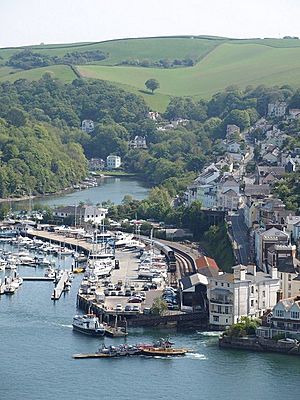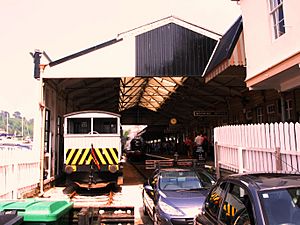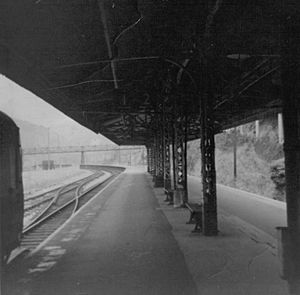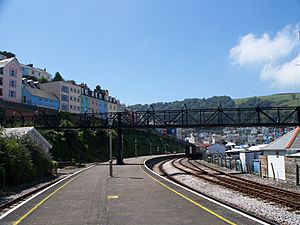Kingswear railway station facts for kids
Quick facts for kids
Kingswear
|
|
|---|---|
| Station on heritage railway | |
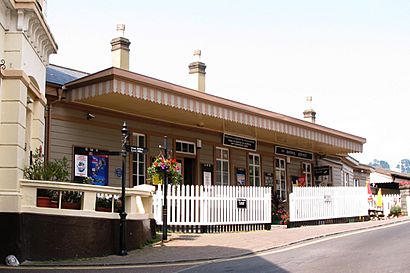 |
|
| Location | Kingswear, South Hams England |
| Coordinates | 50°20′56″N 3°34′21″W / 50.34882°N 3.57253°W |
| Operated by | Paignton and Dartmouth Steam Railway |
| Platforms | 2 |
| History | |
| Original company | Dartmouth and Torbay Railway |
| Pre-grouping | Great Western Railway |
| Post-grouping | Great Western Railway |
| Key dates | |
| 1864 | Opened |
| 1972 | Preserved |
Kingswear railway station is the very end of the line for the Dartmouth Steam Railway. This railway is a special heritage railway in Devon, England. The station is right in the middle of Kingswear town. It sits on the edge of the River Dart, directly across from Dartmouth.
You can easily walk from the street into the station. It's also very close to the Yacht Club Hotel. Right next to it are the docks for the Dartmouth Passenger Ferry and the slipway for the Dartmouth Lower Ferry.
Contents
History of Kingswear Station
Building the Railway
The railway line to Kingswear was built by the Dartmouth and Torbay Railway company. It first opened on 16 August 1864. The original plan was to reach Dartmouth itself. However, the railway station in Dartmouth never had train tracks or platforms. People bought tickets there, but they always had to take a ferry to Kingswear to catch a train.
In 1866, the railway company opened the Yacht Club Hotel. It was built at the south end of the station. This hotel was mainly for people traveling on big ocean ships. These ships often stopped in Dartmouth back then.
Trains for Goods and Coal
Goods trains started running to Kingswear on 2 April 1866. These trains were very important. They helped ship goods out to sea. They also carried coal that arrived at Kingswear by boat. This coal went to the gas works at Hollacombe. This place was between Paignton and Torquay railway stations.
Changes in Ownership and Tracks
The Dartmouth and Torbay Railway was always run by the South Devon Railway Company. On 1 January 1872, the two companies joined together. But this didn't last long. On 1 February 1876, the South Devon Railway became part of the Great Western Railway.
When it was first built, the railway used a very wide track called the broad gauge (7 ft (2,134 mm)). On 21 May 1892, the line closed for a weekend. Workers quickly changed the tracks to the standard gauge (4 ft 8 1⁄2 in (1,435 mm)). About 28 men worked in the area. They stayed in the station's goods shed, which was by the river.
In 1894, new side tracks were added. A signal box was opened to control the trains. The next year, even more side tracks were built on land taken from the river. A long footbridge was also built over the station. It allowed people to walk from the main road to the river's edge.
Upgrades and Changes
The railway originally crossed three small rivers on low wooden bridges. Two of these bridges were taken down in 1923. This happened when the railway line was moved further inland. The Hoodown Viaduct, just outside the station, was replaced in 1928. A new steel bridge with two tracks was built. This, along with a bigger turntable, allowed larger trains to reach Kingswear. The station platform was also made longer in 1929. It grew to 850 feet (259 m), so longer trains could stop there.
Modern Times and Preservation
In 1948, the Great Western Railway became part of British Railways. This was when railways in Britain were nationalised (taken over by the government). In 1960, the signal box got a new control system. But soon, fewer trains started running.
The wharf (where boats loaded goods) closed in 1964. Regular goods trains stopped in 1965. From 1966, most trains ran as a shuttle service from Paignton. Sunday trains stopped in 1967. On 20 October 1968, the signal box closed.
In November 1968, there was a plan to close the whole line from Paignton. But instead, on 30 December 1972, the line was sold. It was bought by the Dart Valley Light Railway plc. This company already ran a nearby heritage railway at Buckfastleigh. The Royal Dart Hotel was sold in 1979. The money from this sale helped pay back the £275,000 paid for the railway line.
In 1976, a second platform track was put back. Points around the station were controlled by small local levers. Since 1990, electric signals have been controlled from a panel at Britannia Crossing.
What Kingswear Station Looks Like
The south end of the platform and tracks are covered by a special wooden train shed. It is 100 feet (30 m) long. A normal canopy extends further along the platform. You enter the station onto the main platform inside the train shed. Trains stop further along the platform. This allows the engine to move to the other end of the train.
The old goods yard, between the station and the water, is now a car park. It is also used for storing boats. The long footbridge at the north end of the station does not connect to the platforms. Instead, it carries a walking path from the main road to the waterfront. Another car park at the north end is where the turntable and carriage storage used to be. Some side tracks are still there. They are opposite the platform and run towards Britannia Crossing. This is a level crossing that leads to the Dartmouth Higher Ferry. It is also where the railway's signal control center is located.
Train Services
Steam trains run seasonally to and from Paignton.
| Preceding station | Following station | |||
|---|---|---|---|---|
| Greenway Halt | Dartmouth Steam Railway | Terminus | ||
| Ferry | ||||
| Terminus | Dartmouth Passenger Ferry | Dartmouth | ||
See also
 In Spanish: Estación de Kingswear para niños
In Spanish: Estación de Kingswear para niños
 | William Lucy |
 | Charles Hayes |
 | Cleveland Robinson |


